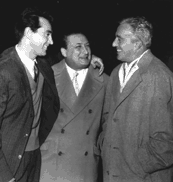
 Vittorio
De Sica (1902-1974), Italian motion-picture director, actor, and producer,
one of the chief exponents of neorealism, a movement among Italian filmmakers
that developed after the end of World War II in 1945. Neorealist directors
used location shooting, nonprofessional actors, and other techniques to
present situations as realistically as possible. In collaboration with
Italian screenwriter Cesare Zavattini, De Sica produced many neorealist
films that explore social issues.
Vittorio
De Sica (1902-1974), Italian motion-picture director, actor, and producer,
one of the chief exponents of neorealism, a movement among Italian filmmakers
that developed after the end of World War II in 1945. Neorealist directors
used location shooting, nonprofessional actors, and other techniques to
present situations as realistically as possible. In collaboration with
Italian screenwriter Cesare Zavattini, De Sica produced many neorealist
films that explore social issues.
De Sica was born in Sora. In the 1920s he started a long, successful career as a comic stage and film actor. In 1940 he began to direct films as well as act, and his films were a radical departure from the glamorous settings, characters, and story lines that were popular before World War II. In Sciuscia (Shoeshine, 1946), one of his first collaborations with Zavattini, De Sica used amateur actors to depict the brutal reality of orphaned children. Ladri di biciclette (The Bicycle Thief, 1948), about a working-class man whose bicycle is stolen, won a special Academy Award for best foreign-language film (before the category was created). Subsequent films with Zavattini included the satirical fantasy Miracolo a Milano (Miracle in Milan, 1951) and Umberto D. (1952), a devastating portrait of a lonely old man in postwar Rome; both films explore the plight of the poor and dispossessed.
In La ciocara (Two Women, 1961), De Sica drew an outstanding performance from Italian actor Sophia Loren in the story of a mother and daughter's survival during World War II. Later in the decade he turned to lighter subjects, in a slicker style, in Ieri, oggi, domani (Yesterday, Today and Tomorrow, 1964; Academy Award for best foreign-language film) and Matrimonio all'italiana (Marriage Italian Style, 1964). Il giardino dei Finzi-Contini (The Garden of the Finzi-Continis, 1970; Academy Award for best foreign-language film) and Una breve vacanza (A Brief Vacation, 1973) reflect his return to serious themes. De Sica directed at least 25 films and acted in more than 150.
(Source: Microsoft¨ Encarta¨ Online Encyclopedia 2000 © 1997-2000 Microsoft Corporation. All rights reserved.)